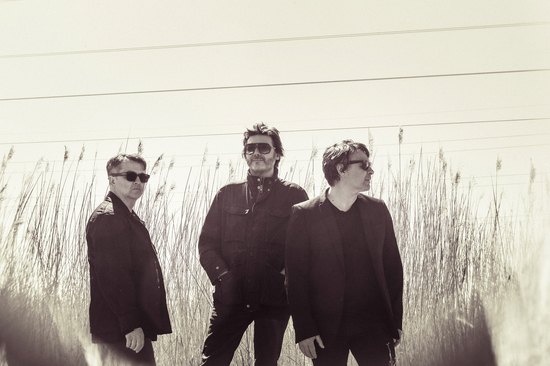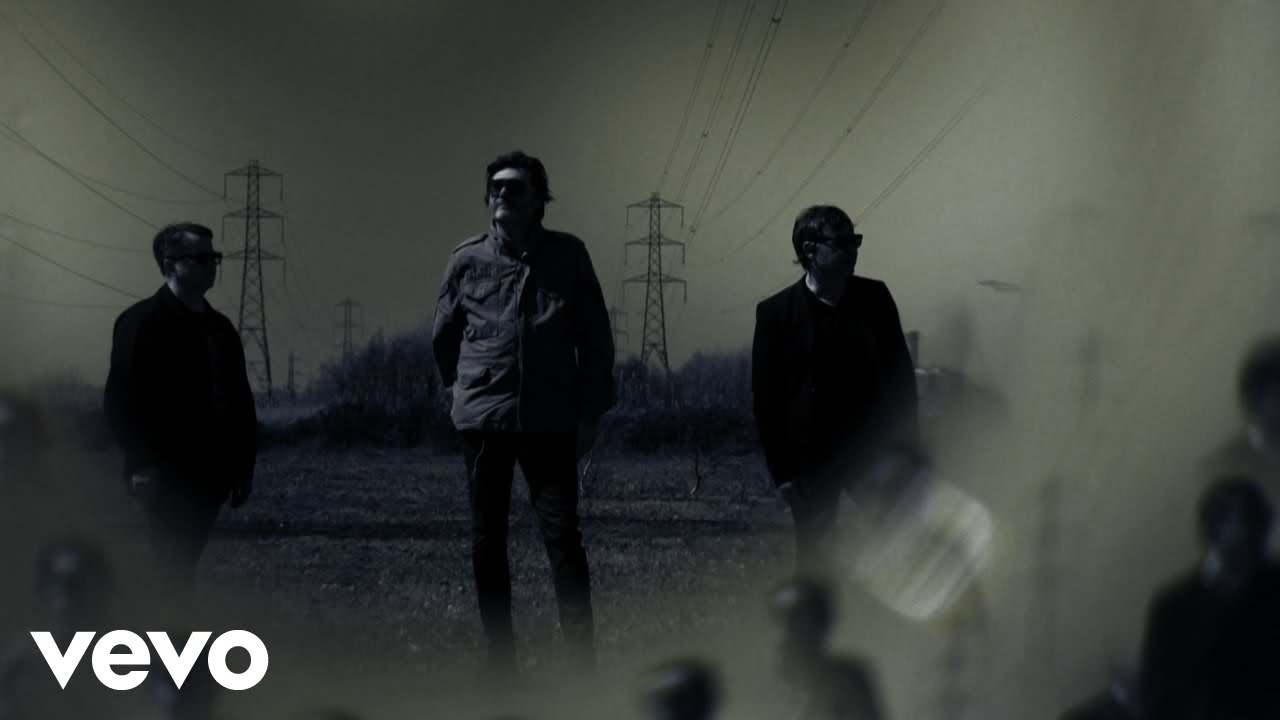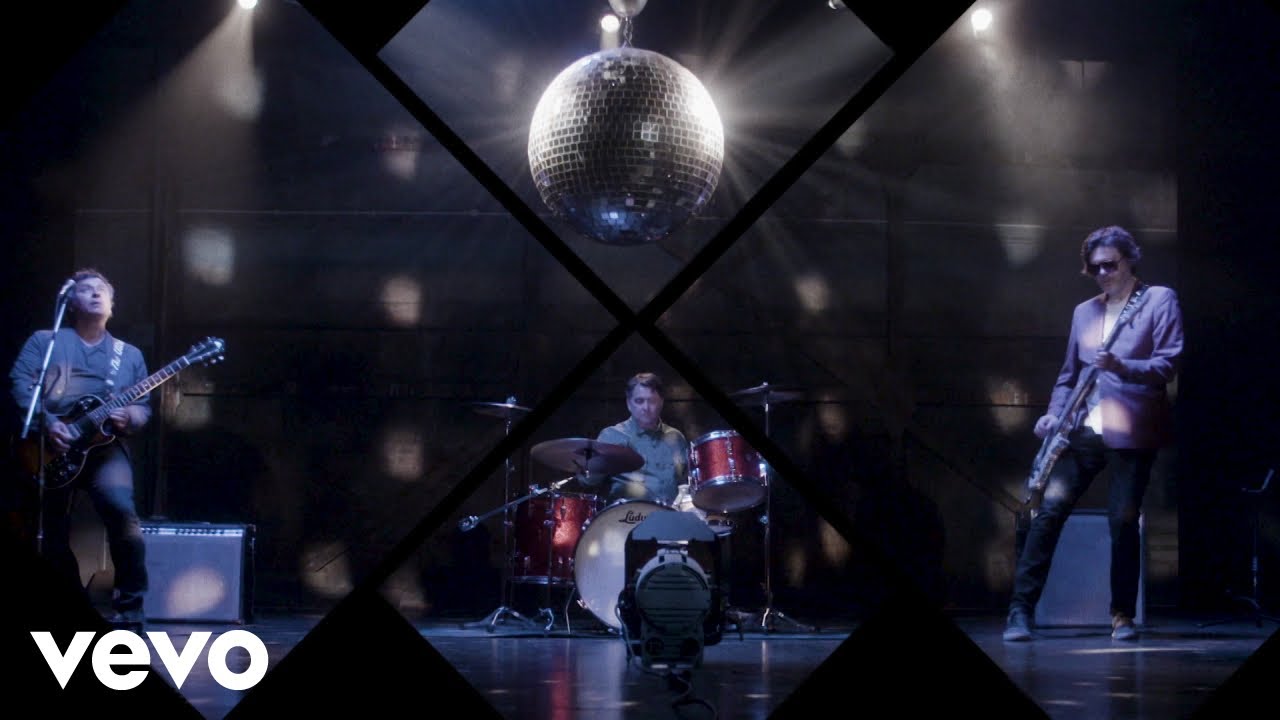“With grace we will suffer. With grace we shall recover.” – Manic Street Preachers, ‘There By The Grace Of God’
It may seem counterintuitive to describe an album which provided Manic Street Preachers with their highest-charting album (UK No.2) in twenty years as a misfire, but commercial facts are never the whole story.
Resistance Is Futile, released in 2018, was the band’s biggest hit since This Is My Truth Tell Me Yours in 1998, and achieved it by consciously tapping into their strings-drenched, anthemic, BRITs-winning, arena-filling heyday of the late nineties. Artistically, however, it’s safe to say – indeed, Nicky Wire has already made statements to this effect – that they were running on empty.
The reasons for that are various. Wire’s parents were both dying of cancer during the run-up to its recording, and his head was understandably in no place for creativity. Furthermore, the back-to-back twin albums Rewind The Film and Futurology in 2013-14 had sapped their juices to needle-in-the-red levels. That they have managed to recover from this perilous situation with The Ultra Vivid Lament, and to do it in considerable style, is not entirely unpredictable if you know their history.
Having lost both parents since Resistance, it would be understandable if Wire found himself creatively frozen. But grief is not experienced uniformly. When a loved one passes away after a long illness, it can release a strangely liberating surge of adrenalin in the bereaved. A sense of freedom to fulfil projects placed on hold, and indeed the impetus to honour the dead by doing so. Furthermore, if ever a band has thrived on sadness, it’s Manic Street Preachers: since the disappearance of Richey Edwards in early 1995, it’s been part of their DNA. For the Manics, grief is living. And the tanks are full.
In order to fully understand any individual Manic Street Preachers album, it is usually necessary to understand all the others. Where most bands would build cautiously on any ground gained, each record the trio releases is typically a reaction against the last. For most of the 21st century, the band have alternated fairly regularly between arty, avant-garde adjacent albums and mainstream, radio-friendly ones. So for example, Journal For Plague Lovers (2009) and Futurology (2014) were in the challenging tradition of their 1994 masterpiece The Holy Bible, while Postcards From A Young Man (2010) and Send Away The Tigers (2007) were more in the commercial vein of Everything Must Go (1996). Resistance Is Futile was in the latter camp, so we were due another swing of the pendulum.
Just when you’re counting them out, they have repeatedly proven themselves capable of bouncing back fully recharged and within touching distance of the peak of their abilities. Exactly where The Ultra Vivid Lament, the fourteenth Manics album, ranks in their oeuvre will only really become clear when the dust has settled. With the first few listens, the initial sense is that if it’s not in their Top 5, then it’s arguably Top Half. Its pleasures are not obvious, slap-you-in-the-face ones. If it has a close relative in the band’s back catalogue, it is 2004’s underestimated, under-loved Lifeblood. (An interviewer from Under The Radar recently put it to Wire that Lifeblood, Futurology and The Ultra Vivid Lament feel like a trilogy, an idea with which Wire agreed.) It moves in subtle shades, pastels rather than primaries, building its moods more delicately than the Route One surges and crescendos of Resistance.
The initial signs were not promising. When the news broke that Manic Street Preachers were about to release a single called ‘Orwellian’, the heart sank. “It [the word ‘Orwellian’] can be weaponised by the left and the right”, James Dean Bradfield explained to Radio X, but in reality it’s become overwhelmingly associated with the right. In 2021, there are two types of people who describe things as ‘Orwellian’: those who have actually read and understood Orwell, and those who never have. The latter are the charlatans and grifters – Laurence Fox, Katie Hopkins, Darren Grimes, Milo Yiannopoulos, Julia Hartley-Brewer, Paul Joseph Watson, Julie Burchill – whose modus operandi is to say something racist or transphobic that’s more foghorn than dogwhistle to their thousands of grimy-palmed sockpuppet followers, which stirs up an inevitable counterreaction, then they squeal in a well-remunerated column in the Telegraph, Mail or Spectator, trailed on the front cover, that they’ve been ‘cancelled’ and that “you can’t say anything theeese days”. That’s who ‘Orwellian’ belongs to now, and the word is an immediate alarm bell. The O-word has gone, and cannot be reclaimed. To even amplify it by using it in discourse is to assist The Very Worst People In Britain.
Obviously Nicky Wire, who has read and understood Orwell, is not one of those people. However, the Manics do have previous in terms of libs-baiting and making complaints about the policing of language. Indeed, Wire did once describe the erasure of the N-word as ‘Orwellian’ in a Metal Hammer interview way back in 1994, in the context of explaining the band’s AA-side ‘P.C.P.’ Though a viscerally thrilling track, it’s fair to say ‘P.C.P.’ has not aged well since it appeared on The Holy Bible. At the time, songwriter Richey Edwards’ tirade against political correctness seemed somewhat petty but excusable. If released today, it would inevitably be received greedily and gratefully as validation by those who turn anyone who argues for the humane treatment of others and a more equal society into a straw man, mocked as the ‘Loony Left’, the ‘PC Brigade’ or ‘woke snowflakes’ (delete according to decade).
Fortunately, any fears that ‘Orwellian’ is “P.C.P. Part 2” were unfounded. Taken in isolation – which is literally what happens when you release a single (especially an album’s lead single) – it feels a little weak, a compromised response to extreme times. “It feels impossible to pick a side”, Wire writes (and Bradfield sings). Does it really, when the right are in the ascendancy? This equivocation smells like a cop-out. However, a reference to “the playing fields and exclusive clubs” does leave no doubt that the Manics have not forgotten who their real enemies are.
If the song is about anything, it’s about the post-truth world. A world in which we are routinely gaslit by our own leaders. A world in which Prime Minister Boris Johnson can deny with a straight face something he said only a week earlier, and anyone but the super-attentive just shrugs. A world in which the very nature of objective reality was undermined after President Donald Trump’s spin doctor Kellyanne Conway offered ‘alternative facts’ to the press corps. This is the sense in which ‘Orwellian’ is intended here. We are at war with Eastasia. We have always been at war with Eastasia.
It is also a song steeped in fear about the internet. (This, specifically "the frightening evolution of social media," was an overarching theme of the previous album, notably on ‘Broken Algorithms’). In the notes which accompany The Ultra Vivid Lament, Wire mentions “the claims and counterclaims of absolute truth and the misery that follows on digital platforms”.
In the past, the fear of futurologists was that "information overload" would drive us insane, sat like Thomas Jerome Newton in The Man Who Fell To Earth, absorbing too many newsfeeds from too many televisions. What few foresaw was that the real danger would be a surfeit of disinformation.
As Patrick Clarke pointed out in his interview with Nicky Wire in The Quietus, ‘Orwellian’ is influenced in part by Jill Lepore’s book If Then, a history of The Simulmatics Corporation, the 1950s-founded data science firm – essentially a forerunner of Cambridge Analytica – which assisted the US military’s PsyOps in Vietnam, and helped politicians to directly target voters and manufacturers to manipulate consumers. The line “And the people machines still making fools out of us” is a direct reference to Simulmatics’ “people machine” computer program which drew on polling information and behavioural science in order to mathematically predict the impact of an advertising pitch or political campaign message.
All this parsing and divining of the song’s meaning, of course, could serve to sideline the music. Which would be criminal. The album’s title is a slight bit of misdirection: at first sight, one would be forgiven for assuming that the Manics are acknowledging their indie-schmindie roots by referencing Ultra Vivid Scene, the late 80s 4AD-signed band led by New York visual artist Kurt Ralske. The album sounds nothing like that. The Ultra Vivid Lament is the first Manics album conceived primarily on piano instead of guitar. James Dean Bradfield recently gave an interview in front of a big brown upright called Margaret, and revealed that he’d spent much of lockdown improving his chops on the piano. Inevitably, switching instrument changes one’s approach to writing. Your hands need to make different shapes, and you intuitively reach for different melodic runs and chord progressions. James’s piano, augmented by additional keys from producer Dave Eringa, keybardist Nick Nasmyth and long-time collaborator Gavin Fitzjohn, is drenched in reverb and sustain (Margaret’s right pedal got plenty of action), lending the album a profoundly eighties feel.
Wire has spoken of a "1974 to 1984" sonic template, namechecking ABBA and Echo And The Bunnymen as prime influences, specifically ‘Waterloo’ and ‘Bring On The Dancing Horses’. (The latter is from 1985, but we won’t split hairs.) They’ve played ABBA’s ‘S.O.S.’ in rehearsals, and have been practicing ‘Bring On The Dancing Horses’ with a view to playing it live.
The Manics’ love of the Bunnymen – the first band they saw live – is well-documented, their love of ABBA less so. But Nicky Wire recently told Under The Radar: "I’ve seen Sean cry to ‘Eagle’ many times," while James has acknowledged that ‘Motorcycle Emptiness’ channeled ‘Dancing Queen’. On this album, bassist Wire and drummer Sean Moore have striven to emulate the (underrated) ABBA rhythm section.

There’s a glacial grace to both bands which the Manics have captured impressively: one thinks not only of ABBA’s frosted Scandinavian melancholy but also the Bunnymen’s run of videos shot in Iceland circa Porcupine. Recorded in winter at their own Door To The River cottage studio in Caerleon and the legendary Rockfield 21 miles away, it’s a profoundly wintry album.
There are nods to Eno without Roxy (in its quieter moments one can hear echoes of Music For Airports), and of Roxy without Eno (‘More Than This’ gets a namecheck in the notes). It also carries a heavy flavour of White Pyjama Music, the retroactive musical genre of the early-to-mid eighties (coined by me), involving wafty, wimpy synth-based bands who often appeared on Top Of The Pops in what looked like white pyjamas, with notable practitioners including China Crisis, Fiction Factory, Wang Chung, Ricky Gervais’ Seona Dancing and H2O. The notes accompanying The Ultra Vivid Lament include nods to White Pyjama touchstones Talk Talk and The Lotus Eaters, as well as Fiction Factory, whose ‘Feels Like Heaven’ – the White Pyjama national anthem – the Manics covered not long ago.
A better entry point for The Ultra Vivid Lament than its lead single ‘Orwellian’ is its first track, ‘Still Snowing In Sapporo’. After a few seconds of beatless electronic thrumming, James sings "I’m walking on my own, it’s 1993…," a piece of direct lyrical exactitude from Nicky Wire which recalls Richey Edwards’ "I write this alone in my bed" from 1993 itself (the opening words of Gold Against The Soul‘s lead single ‘From Despair To Where’), placing you in a precise moment and location. (The line "It feels so real, like cheap golden glitter" also refers to ‘From Despair To Where’)
A reminiscence about a four-piece Manics’ early visit to Japan, it revisits the poignancy of 1998’s ‘The Everlasting’ ("In the beginning, when we were winning, when our smiles were genuine…"), remembering when "it was the four of us against the world." It accepts, however, that the quartet were on borrowed time: "It couldn’t last without the hurt…" From the very start, this is an album whose tendrils and roots extend to other parts of the Manics’ history. Even structurally, it echoes the band’s past: ‘Still Snowing In Sapporo’ builds into a big Manics lungbursting anthem, then retreats again, then rebuilds, then retreats. It’s the band’s own trajectory in microcosm.
The lyrics, Wire says, are inspired by ‘Snow Is Falling In Manhattan’ by Purple Mountains, but sonically it’s closer to The Cure in their late 80s commercial pomp. The synths are straight out of ‘In Between Days’, the song the Manics covered when Robert Smith hand-picked them to play his Meltdown Festival in 2018.
It’s followed by ‘Orwellian’, about which the best thing you can say is that it makes far more sense in context. Upon hearing the line "the future fights the past" after ‘Still Snowing In Sapporo’, the mind skips back to ‘Everything Must Go’ and “I look to the future, it makes me cry”. The Manics are constantly caught between the past and the future, between the horrors (and comforts) of the former and the possibilities (and terrors) of the latter. This is why Wire so often seems to exist in a perpetual present tense, cocooned in the blissful stasis of domestic boredom (a topic to which, later in the album, he will return).
The third track, ‘The Secret He Had Missed’, is a duet with Sunflower Bean’s Julia Cumming which enacts an imaginary dialogue between Welsh artists Augustus and Gwen John. Of the two siblings, both of whose works hang in the National Museum of Wales in Cardiff, post-impressionist Augustus is the more famous, as much for his bohemian lifestyle as his post-impressionist painting. Gwen, however, is better known for moving to Paris and having an affair with Rodin, but withdrew to a subdued, religious life after the French sculptor’s death, in stark contrast to her flamboyant brother’s revelries. It is Gwen, however, who is increasingly considered more talented of the Johns by many art historians, and Wire’s lyric posits a counterfactual world in which it is Gwen who overshadows Augustus.
The words “the girl in the long blue dress cast a spell and left us blessed” would appear to refer to Gwen John’s painting The Convalescent, which gave its title to a track on 2001’s Know Your Enemy. However, ‘The Secret He Had Missed’ is more intricately interwoven with another, more recent Manics song. ‘Dylan And Caitlin’, from Resistance Is Futile, was another duet (with The Anchoress taking the female role), about the relationship between another Wales-based artistic male and female duo, Dylan Thomas and Caitlin Thomas (nee McNamara). The stories of the Johns and the Thomases are interlinked: the Thomases were both painted by Augustus John, in Caitlin’s case during her early teens, during which time John raped her. Later, it was Augustus John who introduced the Thomases. Caitlin, like Gwen, lived in France for a while.
While joining a long line of art-related Manics songs (from ‘La Tristesse Durera’ to ‘Interiors’ to ‘Black Square’), its closest cousin musically is ‘Your Love Alone Is Not Enough’, with an almost equally rousing chorus, and Julia Cumming’s restrained vocal bearing a close similarity to that of Nina Persson. It’s an interesting exercise, albeit one which is unduly humane to a rapist. And it’s one the album’s most Wales-specific moment, complete with references to the beach at Tenby.
‘Quest For Ancient Colour’ is both the least and most mysterious song: literally a lyric about a dream, which leaves Wire feeling that his soul is ‘a suburban sinkhole’. It also reprises many of the album’s themes, such as techno-fear ("Modern life was killed and crushed/By a derelict digitised love") and, above all, confusion ("I used to make sense, but now I am confused"), and expresses what Wire has called "strange Covid dreamscapes" and "an eternal sunset of the heart". Inspired by Nina Simone, Elton John and Billy Joel, its structure alternates between confessional verses and a yearning chorus, and culminates in a wheeling guitar solo reminiscent of Rush’s Alex Lifeson. It also contains a reference to Don Henley’s ‘The Boys of Summer’, one of the greatest songs ever written, demonstrating that the Manics’ love of widescreen 80s pop knows no boundaries between cool and uncool.
‘Don’t Let The Night Divide Us’ – whose title bears faint echoes of The Doors and (again) Dylan Thomas – is a call for unity in the face of divide-and-rule tactics, and retrospectively makes more sense of the ambiguities of ‘Orwellian’. The album’s most up-and-at-em moment, it includes the couplet "Don’t let those boys from Eton/Suggest that we are beaten" and urges us to "Reject all propaganda/They can’t hide from truths arrow," before threatening vengeance which "may use peace or violence".
Regarding ‘Diapause’, Wire has acknowledged the influence of Nick Cave’s ‘Jubilee Street’ (one which they would never have countenanced a few years ago), and finds a similar stoic stillness. It’s a song about retreating into one’s self as a coping strategy for grief and loss. "I’ve built so many walls to keep these feelings true/I’ve burnt so many bridges but not the one that leads to you" is one of many post-1996 Manics lyrics which it is difficult to read as anything other than a reference to Richey Edwards. Again, it throws back to 1993, “I looked into the sunset I screamed and I sighed” consciously repeating words from ‘La Tristesse Durera’.
"Complicated Illusions" is explained by Wire as being about the philosophical battle between Deconstructivism (does he mean Deconstruction?) and Structuralism, but I wouldn’t be Saussure. The line "I defend the middle ground" sets off the Centrist Dad alarm, but it’s more about the nature of truth, a subject which is woven throughout the album.
On the featherweight and poppy ‘Into The Waves Of Love’, Wire-via-Bradfield delivers a summary of his mindset so succinct that it’s laugh-out-loud hilarious: "I don’t know what it is that I believe in/But it involves misery and keeping still…" There’s also an apparent reference to Laurie Anderson (and therefore, in turn, William Burroughs) in the words "Language a virus without reason." The track unravels into entropy when Cardiff-based singer Cat Southall adds demented wailing, described accurately as "a fleeting glimpse of ‘The Great Gig In The Sky’," before reassembling itself.
"Blank Diary Entry" is a duet between Bradfield and Mark Lanegan, who first met when the Manics and Screaming Trees supported Oasis on a US tour in 1996, and reconnected years later when they both appeared at a tribute show to Nico’s The Marble Index and shared a dressing room. Lanegan is a tedious grunge tough guy who throws around the homophobic epithet ‘cocksucker’ as a go-to insult, but his ruined voice works well here as a foil for Bradfield’s purer tones, somewhere in a pentagon plotted between Tom Waits, Lou Reed, Lee Hazlewood, William Burroughs, and Sam Elliott in The Stranger from The Big Lebowski mode, perfectly suited to Biblical lines like "In a garden full of locusts, pain was a crying man/Wrapped in several kinds of skin, seeking consolation in machines…"
‘Happy Bored Alone,’ with it’s Ronseal-like title, is almost self-parodic: ask Nicky Wire if he’s been up to much, and he’ll get a whole album out of telling you he hasn’t. It’s a throwback to the days of ‘My Little Empire’, ‘Mr Carbohydrate” and turning up at awards ceremonies in an "I Heart Hoovering" top, but it’s a theme that’s never really gone away. One of its lyrical references reaches back further still: "I was praying to a godless sky" paraphrases Sylvia Plath’s "I talk to god but the sky is empty", previously attached to the song ‘Motorcycle Emptiness’ on Manics artwork.
The closing ‘Afterending’ – a classic post-Richey Manics songtitle – was musically inspired by stadium-era Simple Minds (James chose their ‘Speed Your Love To Me’ on BBC Radio 2’s Tracks of My Years), it features an incongruous la-la-la chant, like a 1970s Eurovision entry from Greece or the Netherlands.
It contains perhaps the album’s clearest topical references to BLM protests and Covid doublethink: "As the flags fall down/The statues crack and drown/We clap for a crumbling state/Inventing rules which we can break/But take no blame…" It was written, Wire says, "when the news cycle was unrelentingly grim and increasingly hard to process," and while he was suffering "a Covid induced fog of confusion and doubt." And it’s that fog, perhaps, which best explains the album as a whole.
What the Manics have to offer is ultimately their own confusion. But that might be the only honest response to bewildering times. The Ultra Vivid Lament is an album which doesn’t always know what it’s saying. But it’s saying it with an uncommon beauty.




